The Instructure Community will enter a read-only state on November 22, 2025 as we prepare to migrate to our new Community platform in early December. Read our blog post for more info about this change.
Turn on suggestions
Auto-suggest helps you quickly narrow down your search results by suggesting possible matches as you type.
- Community
- Explore
- The Product Blog
- Rich Content Editor (RCE). in Fill-in-the-Blank Qu...
Rich Content Editor (RCE). in Fill-in-the-Blank Questions
- Subscribe to RSS Feed
- Mark as New
- Mark as Read
- Bookmark
- Subscribe
- Printer Friendly Page
- Report Inappropriate Content
Rich Content Editor in Fill-in-the-Blank Questions
Introduced in the End of Quarter 1 update, the Rich Content Editor (RCE) in Fill-in-the-Blank questions has now been released to Production environments giving users the capabilities to create FITB questions with paragraph formatting, scientific or mathematical formulas, or a table. This feature supports fill-in-the-blank types for fill-in-the-table, multiple drop-down, multiple fill-in-the-blank sentences, and entering equations or formulas. Possible Answer Types include a dropdown, open entry, or word bank. This feature is poised to make a big difference for customers who are looking to format questions in a very specific way to mimic the questions on formal exams.
One great example of how RCE in Fill-in-the-Blank questions expands the options for formatting questions is where nursing programs are preparing their students for the NCLEX licensure examinations. Programs now have the capabilities to create questions in the formats similar to how they appear in those exams.
In our response to a customer Idea in this conversation, we compiled a list of the seven new NCLEX NGN question types with suggestions on which Canvas question types could be used and where there might be alternative question types that can be used. As with the other types of NCLEX questions, there may be some adjustment using the available types of questions on Canvas to get the format aligned with how NCLEX question types appear. Not all of the suggested question types are exact matches, 1 for 1, to the NCLEX question types but there may be different ways to make the functionality work.
Canvas Question Type Suggestions for NCLEX NGN Question Types
NCLEX NGN Question Type: Extended Multiple Response
Similar to the multiple-choice item type on the previous iterations of the NCLEX, the item stem for an extended multiple-response question is a text-based scenario that outlines a realistic situation in healthcare. The extended model has more options and requires, or allows, for more than one correct answer. Exam-takers can earn partial credit on these questions.
Canvas Question Type: Multiple Answer Question Type
Multiple Answer Question Type:
NCLEX NGN Question Type: Extended Drag-and-Drop
Like the ordered response questions (alternate-format NCLEX questions), the extended drag-and-drop items often require test-takers to prioritize aspects of patient care or presenting symptoms. A major difference between the two is that not all response options are required or appropriate.
Canvas Question Type: Fill-in-the Blank Question with a Word Bank Answer
(There are some known issues with the word bank answer type that are currently being addressed. For now, we suggest setting up the same question using multiple dropdowns instead of word banks.)
Word Bank:
NCLEX NGN Question Type: Cloze (Drop-Down)
With this item type, exam-takers must choose from a list of possible options from drop-down menus that appear in a sentence, chart, or table. There could be up to six responses for each item.
Canvas Question Type: Fill-in-the-Blank Question with a drop-down answer
Drop-down:
NCLEX NGN Question Type: Enhanced Hot Spot (Highlighting)
These items allow exam-takers to highlight one or more portions of a text or table concerning a client’s medical record to answer the question.
Canvas Question Type: Hotspot
If the text or table is an image, a student could click part of it, however this type only allows for a single zone/answer per question.
Hot Spot:
Alternative: Multiple Choice for selecting text, if the spots have labels or highlights, they could ask them which label is correct
Multiple Choice Option:
NCLEX NGN Question Type: Matrix/Grid
Used to measure multiple aspects of a clinical scenario, this question type requires exam-takers to choose one or more answers from a row and/or column in the matrix (grid).
Canvas Question Type: Fill-in-the-Blank using a table
Fill-in-the-blank using a table and drop-downs:
Alternative: Stimulus on the left with a series of multiple answer questions, one for each row. Currently, multiple answer questions require at least one selection. So, this type wouldn’t work if all options are supposed to be unselected.
Stimulus:
NCLEX NGN Question Type: Bowtie
For this item type, exam-takers place answers in the five spaces that resemble a bow. For example, a candidate will place the answer for the condition the patient is most likely experiencing in the middle of the bowtie. The two answers on the left may correspond to appropriate actions to take given the condition. The two answers on the right side of the bowtie would then represent the parameters to monitor and gauge the patient’s progress.
Canvas Question Type: Fill-in-the-Blanks with Dropdowns allows for specific lists for each item
Rich Content Editor in the Fill-in-the blanks can recreate the layout of the bowtie using an invisible table and use dropdowns for specific lists.
Using invisible table and dropdowns:
Alternative: Categorization question
Categorization:
NCLEX NGN Question Type: Trend
Addresses multiple steps of the NCJMM by having the student review information over time. Trend standalone items can feature any item response type.
Canvas Question Type: Stimulus on the left with a series of questions
More info can be found here: https://community.canvaslms.com/t5/Instructor-Guide/How-do-I-insert-stimulus-content-in-New-Quizzes/...
Labels
The content in this blog is over six months old, and the comments are closed. For the most recent product updates and discussions, you're encouraged to explore newer posts from Instructure's Product Managers.
3 Comments
Marissa Pio Roda
Instructure AlumniAbout
Product Manager
Bio
Product Manager at Instructure
Badges
 Community help
Community help
To interact with Panda Bot, our automated chatbot, you need to sign up or log in:
Sign inView our top guides and resources:
Find My Canvas URL Help Logging into Canvas Generate a Pairing Code Canvas Browser and Computer Requirements Change Canvas Notification Settings Submit a Peer Review AssignmentTo interact with Panda Bot, our automated chatbot, you need to sign up or log in:
Sign in


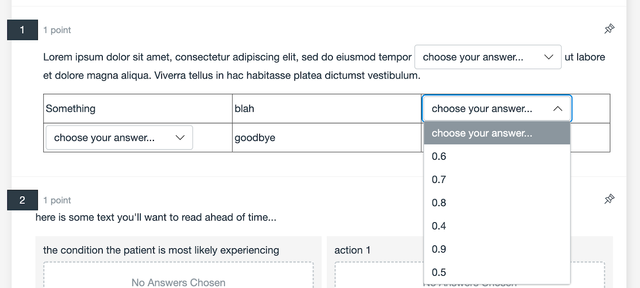

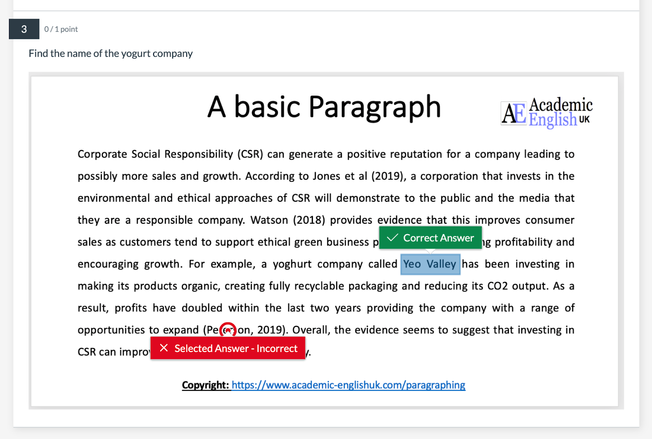
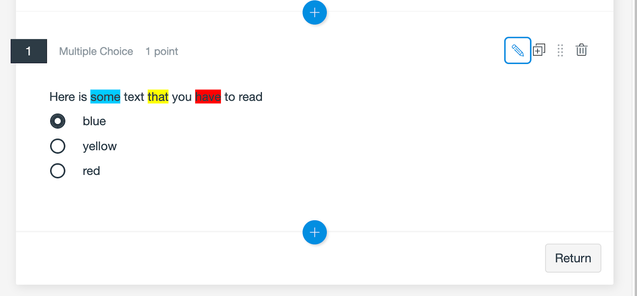

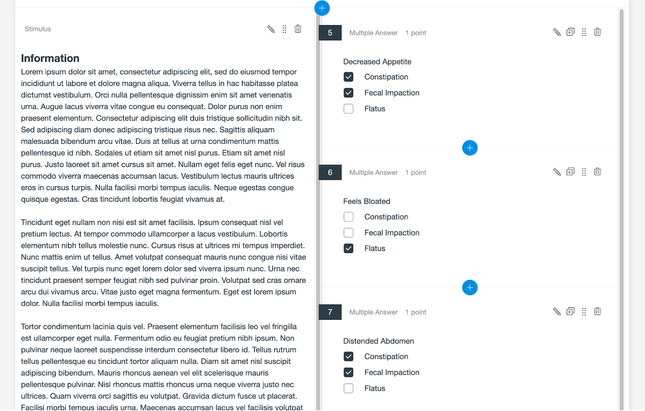
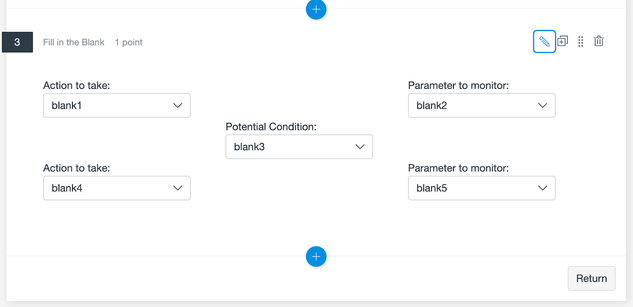
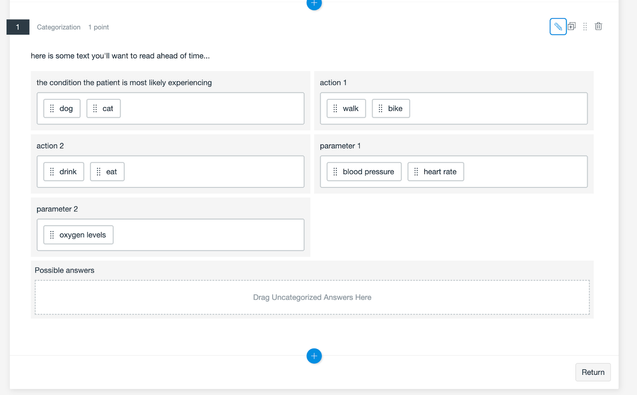
The content in this blog is over six months old, and the comments are closed. For the most recent product updates and discussions, you're encouraged to explore newer posts from Instructure's Product Managers.